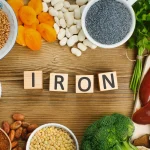What is iodine?
Iodine is an element that is essential for normal growth and for the development of the brain. The body needs iodine to make thyroid hormones in the thyroid gland. Thyroid hormones influence metabolism. They are essential for the development and function of the brain, nerves and bones.
A healthy diet needs enough iodine, but too much can cause health problems.
Read more on the role of iodine and your health.
What is iodine deficiency?
Iodine deficiency occurs when you don’t have enough iodine in your body. This usually occurs because you don’t consume enough iodine in your diet.
Iodine deficiency is the most common cause of thyroid problems. Iodine deficiency is a growing problem in Australia, especially among children and people who are pregnant or breastfeeding. These groups are at risk of thyroid problems and other serious consequences.
What are the symptoms of iodine deficiency?
Many people with iodine deficiency don’t have symptoms.
In other people, low iodine causes hypothyroidism (underactive thyroid).
Symptoms of hypothyroidism include:
- severe tiredness and muscle weakness
- unexpected weight gain
- depression
- thick puffy skin or puffiness of the face
- difficulty concentrating
- weak, slow heartbeat
- dry skin
- hair loss
- feeling cold
- constipation
- enlarged thyroid or goitre
Who is at risk of iodine deficiency?
While anybody can develop iodine deficiency. It’s more common in people who are pregnant or breastfeeding (who have higher iodine needs), and unborn or newborn babies.
In some parts of Australia, there isn’t enough iodine in the soil, so foods grown there won’t contain as much iodine. This means that people eating these foods may be at a greater risk of iodine deficiency.
To address this problem, iodine is added to most table salts (known as ‘iodised’ salt). Since 2009, all breads in Australia that are not organic must contain iodised salt. This helps ensure that most people get enough iodine.
Some people don’t get enough iodine because the foods that contain it, such as seafood, tend to be more expensive. Eating organic bread or specialty salt may also mean people are missing out on iodine in their diet.
How is iodine deficiency diagnosed?
Your doctor will do a physical examination and order a urine test or a thyroid stimulating hormone (TSH) blood test. If the results show abnormal levels of TSH, you may have further tests such as an ultrasound to look at the thyroid gland.
In Australia, all newborn babies have a screening blood test. This is known as the neonatal screening test (NST) or ‘heel prick’ and tests for a range of rare medical conditions. This includes low thyroid hormone levels, which can in some circumstances be a sign of iodine deficiency. Identifying thyroid problems early in life ensures affected babies can receive treatment before complications occur.
How is iodine deficiency treated?
Iodine deficiency is usually treated by:
- eating more foods containing iodine
- using iodised salt
- taking iodine supplements
People with hypothyroidism may need treatment with a synthetic form of thyroid hormone.
How is iodine deficiency prevented?
Most people can get enough iodine from eating iodine-rich foods such as seafood. Seasoning your food with small amounts of iodised salt and eating packaged bread will also help increase iodine in your diet.
The National Health and Medical Research Council recommends that you take an iodine supplement of 150 micrograms a day if you are:
- pregnant
- breastfeeding
- planning a pregnancy
Ask your doctor for more information.
It’s important that you don’t take more than the recommended dose of supplements. If you have a thyroid condition, speak to your doctor before taking iodine supplements.
What are the complications of iodine deficiency?
Iodine deficiency can cause hypothyroidism (underactive thyroid).
In females, iodine shortage can also cause:
- fertility problems
- problems with pregnancy such as miscarriage, stillbirth and premature birth
Unborn babies and young children who have iodine deficiency are at a higher risk of:
- brain damage
- intellectual disability
- stunted (poor) growth


